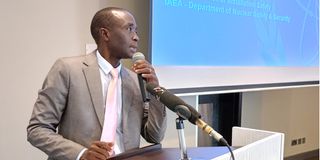Nuclear agency to conduct radiation mapping

Shadrack Kiti, director of standards at the Kenya Nuclear Regulatory Authority, speaks during a training session on nuclear safety in Nairobi on 10 July.
The government will closely monitor mineral exploration across the country amid fears of potential dangers to life and the environment.
On Monday, the Kenya Nuclear Regulatory Authority (KNRA) said it had embarked on a nationwide radiation mapping, with a particular focus on uranium exploration.
"We are embarking on a nationwide programme of environmental radiation mapping and regulatory oversight of uranium exploration for radiation protection, nuclear safety and security purposes," said KNRA Director for Standards Shadrack Kiti.
Mr Kiti was speaking in Nairobi on Monday at a training session on the safety of nuclear technology attended by a multi-agency team from the Kenya Defence Forces, the health sector and the International Atomic Energy Agency (IAEA).
At the forum, officials identified the safe use of nuclear technology as a possible intervention against climate change and food insecurity.
The experts said that beneficial applications of nuclear energy in health, energy and security continue to impact lives, but that there is insufficient knowledge about them among policy and decision-makers.
They called for more peer reviews and workshops to highlight the benefits.
"It is important that the benefits of nuclear technology are communicated to all, so that the safety of its use is given the priority it deserves and safety is not compromised," said Mr Kiti.
The week-long workshop, which KNRA officials hope will lead to better oversight and understanding of nuclear safety issues among key stakeholders, attracted participants from the Kenya Defence Forces, the health sector and the International Atomic Energy Agency (IAEA).
In the past, nuclear technology has been widely misconstrued as being only associated with war and prone to accidents, a situation that participants at the forum linked to inadequate regulatory oversight.
"In the past, poor procedures, poor training, procedural deficiencies, lack of safety culture and unclear accountability have contributed to past nuclear accidents," Mr Kiti added, citing the example of the Chernobyl accident.
The accident occurred on April 26, 1986 when a reactor burst at the Lenin Atomic Power Station at Chernobyl in the then Soviet Union, due to an operational error as engineers tested if the turbine generator could produce enough energy to run coolers when cut off the power grid. The destructive potential of the accident was 100 times more fatal than the Hiroshima and Nagasaki incidents in 1945 combined.
Mr Kiti, at the same time, said Kenya was committed to honouring the IAEA safety guidelines and code of conduct. “Kenya, through the KNRA, affirms its cooperation with IAEA towards the enhancement of regulatory services to the peaceful development of nuclear technology,” he said.
IAEA was represented at the forum by Jongile Majola and Gabriel Soare among others, who called for sustained collaborations in efforts towards ensuring safety in nuclear utilisation.
Last month, Kenya hosted representatives from 22 African countries to take stock of gains and challenges in nuclear regulation, with fresh calls to governments to make binding commitments to international decrees on nuclear safety.
Country representatives came up with action plans, which include reviewing internal controls and enacting legislation that would support the safety and security of radioactive sources, including disused ones.
The forum also discussed ways of improving patients’ protection from radiation sources, tightening authorisation and inspection, enforcement for safety and security of radiation sources, and proper monitoring of import and export of radiation sources.
KNRA Director General James Keter said the agency will continuously work with stakeholders and embrace the highest international standards towards the safety and protection of lives and property. “We will work round the clock to ensure protection,” he said.
Recently, Kenya signed an MoU with the US government to upscale its nuclear programmes under President Joe Biden’s climate agenda.


